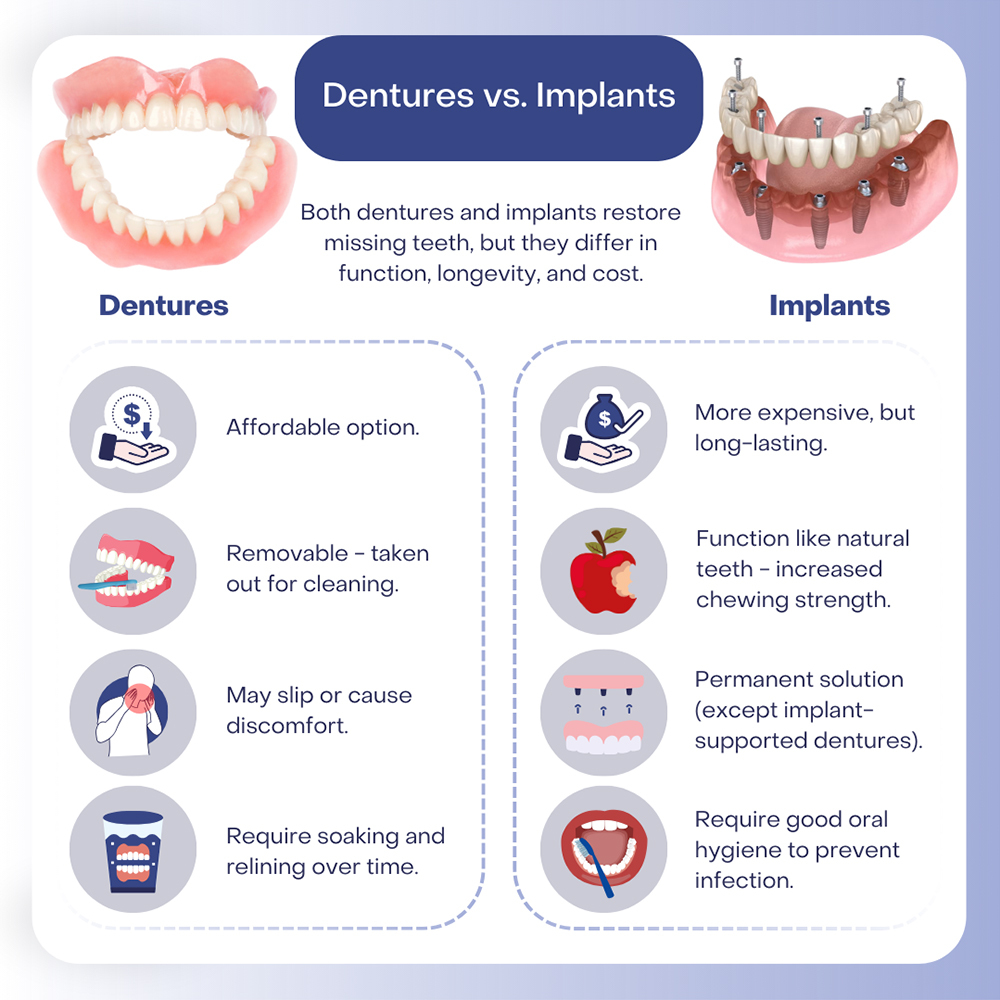Table of contents
When one or more teeth are missing, possible options to replace them include implants and dentures. While both restore missing teeth, each works very differently. Your choice will most likely depend on costs, the health of your remaining natural teeth and jawbone, and overall health. It is also down to personal preference.
Dentures and implants have advantages and disadvantages but have factors in common. They will support your facial muscles, help you speak clearly, and eat properly. Both restore your smile, helping to increase self-confidence and self-esteem.
This article discusses each treatment’s pros and cons, helping you make a considered choice.
 Dentures are removable prostheses that replace natural teeth and some gum tissue. They can restore one or multiple teeth in the upper or lower arch or a complete row of teeth. Dentures are made using a dental impression of your mouth and fabricated with an acrylic gum-colored base that supports the denture teeth.
Dentures are removable prostheses that replace natural teeth and some gum tissue. They can restore one or multiple teeth in the upper or lower arch or a complete row of teeth. Dentures are made using a dental impression of your mouth and fabricated with an acrylic gum-colored base that supports the denture teeth.
The dentures rest directly on the gums. Full dentures that replace all the teeth in an arch rely solely on the gums and jawbone underneath for support and retention. Partial dentures replacing one or more missing teeth in the upper or lower arch have clasps that fit around existing natural teeth or special attachments that fit into crowns so they are held more securely in the mouth.
Implants artificially replace natural tooth roots using a small screw or post that is surgically inserted into the jawbone. Once in the bone, it needs time to fuse or Osseointegrate, which usually takes 3 to 6 months. A special connector called an abutment is attached to the implant post.
The abutment supports the final prosthesis, which could be a single implant crown. Multiple implants can support an implant bridge. Both implant crowns and bridges are non-removable and are screwed or cemented onto the dental implants. In comparison, implant dentures can be removed by the patient but are held firmly in place by dental implants.
The process of planning, fitting, and restoring implants is far more advanced and sophisticated than dentures, but it is an increasingly popular treatment.
There are various factors to consider, including the following.
Dental implants are more expensive than dentures; the cost can run into thousands of dollars per tooth. The price of a dental implant depends on the implant system selected and the materials and techniques used for the final restoration. It also depends on whether additional procedures like bone grafting are needed to prepare the mouth for implants.
In comparison, the cost of dentures is considerably lower. A complete set of full dentures replacing an upper or lower arch is an affordable way to replace teeth. The final price depends on the number of teeth the denture will restore and the quality of the denture teeth selected.
Your dental insurance will almost certainly meet the cost of dentures. It may not cover all or any of the costs of dental implants. However, dental insurance policies covering dental implant treatment are changing, so it’s worth checking with your provider.
Dental implants are easy to maintain. They must be brushed at least twice daily using an ordinary soft-bristled toothbrush. Like natural teeth, they must be flossed around properly to remove all plaque and food debris.
Professional dental care should include regular checkups and hygiene appointments so the hygienist can clean the implants professionally.
Dentures can require more time to care for each day. They must be removed overnight and cleaned thoroughly after eating using a soft denture brush and proprietary denture cleaner or dish soap. Overnight, they should be soaked in a special cleaning solution or water to keep them moist and prevent them from warping.
Over time, dentures can begin to fit less securely due to changes in the jawbone’s shape. Therefore, they must be relined periodically where additional material is added to the fitting surface to get them to fit more securely.
Dental implants are a more permanent solution, provided they are properly cared for and should remain strong and durable for years or for life. Restorations like implant crowns, bridges, and implant dentures may require periodic replacement.
There is a risk of complications with every dental treatment, including implants and dentures.
Well-planned dental implants have a high success rate, typically 95% or even higher at 98%. They are generally a safe solution for missing teeth, but there is always a risk of complications.
Potential complications can include infection if they are not properly cared for. Implant restorations can age or fail. Occasionally, mechanical problems can occur with the implant post or abutment.
Complications with dentures are more common, especially after they have been worn for a few years. The jawbone supporting the dentures continues to resorb without the stimulation provided by natural teeth. Gradually, the ridge of bone that supported natural teeth becomes narrower and flatter. This results in the denture beginning to move around. Some of the most common complications caused by these movements are:
Some of these problems can be resolved by relining the denture or remaking it, but they do not address the underlying issue, which is jawbone loss. Denture adhesive can help, but it is messy and expensive.
When you visit My New Jersey Dentist, we examine your mouth, determine if you are suitable for implants or dentures, and explain each treatment in more detail. However, there are still some other factors you need to consider.
Dental implants require a certain amount of strong and healthy bone to support the implant screws. Jawbone loss can occur through tooth loss, gum disease, or injury. The jawbone is naturally thinner in certain areas of the mouth, for example, near the sinus cavities.
If you have lost some jawbone, you may need bone grafting to be a good candidate for treatment. Bone grafting is a straightforward procedure, but it increases the time and price of treatment. While the results can last for life, not everyone is prepared to go through this process or is suitable.
Dental implants aren’t suitable for anyone aged under 18 unless it is clear their jawbone and teeth have stopped growing and developing. Because implants are permanent, they are more popular amongst middle-aged people who may be able to enjoy them for decades to come.
While older adults may not wish to go through the process of having implants because it is more time-consuming and invasive, many people in their 80s or even 90s have chosen this treatment and found it very successful. However, some people may still prefer dentures.
Dental implants provide excellent functionality. Because they are digitally planned, we can determine how they will look and function once fully restored. Dental implant teeth are more comfortable and provide far greater biting and chewing strength than dentures.
However, implant-supported dentures or an overdenture can be a good compromise. This option is a hybrid of both treatments, where only a few implants support a denture that clips onto them firmly yet is removable daily. An implant overdenture has greater biting and chewing strength than a conventional denture yet is more affordable compared with dental implant teeth that are non-removable.
Both implants and dentures require a good oral hygiene routine. If you fail to clean dentures regularly, the risk of gum and fungal infections increases. Failing to clean dental implants properly increases the risk of failure.
Some people make the mistake of thinking that because implants are inert, they cannot become infected, but fail to consider the gum and bone around them. These tissues can become infected with a condition similar to gum disease called peri-implantitis.
Dental implants generally require less daily care than dentures but must be cleaned thoroughly. Daily oral care must be backed up with regular oral hygiene appointments so they can be cleaned professionally.
Dental implants could be a waste of money if you know you will not stick to a good oral care routine. Therefore, dentures might be a better choice for anyone less willing or able to look after dental implants on a daily basis.
There is much to consider, but we can help you choose between dental implants or dentures after your initial consultation. While implants are more expensive, they can provide decades of use compared to dentures. However, some people just want to replace their missing teeth as quickly and cost-effectively as possible.
We can help you consider all the options and look at your priorities and aims for treatment before making a final, confident decision on replacing missing teeth.

My name is Victoria Kushensky. I am a general dentist dedicated to remaining at the forefront of my field. Combining compassionate care with extensive knowledge, I offer cosmetic and general dentistry services as well as advanced root canal treatments.
I earned my Doctor of Dental Surgery (DDS) degree from the esteemed New York University College of Dentistry. Throughout my career, I have honed my skills in various dental procedures, ensuring effective treatment for each patient’s unique needs. I prioritize patient comfort and understanding, taking the time to thoroughly explain procedures and address any questions.
More about Dr. KushenskyMy NJ Dentist: Victoria Kushensky, DDS
385 Prospect Ave Suite 304
Hackensack, NJ 07601
(201) 298-8000